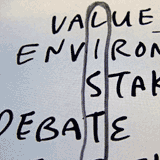
Profiles
Strategy + Business

2003, Issue 32
The Voice of the Stakeholder
By Judith Samuelson and Bill Birchard
In 1996, Monsanto Company hired UK consultant John Elkington to help its executives better understand how to run a sustainable corporation - that is, a company that seeks to preserve the environment for future generations. But by 1998, Mr Elkington, chairman and founder of SustainAbility, a pioneering consultancy that advises corporations on environmental strategy, had terminated the relationship. In his 2001 book, The Chrysalis Economy: How Citizen CEOs and Corporations Can Fuse Values and Value Creation, Mr Elkington complained that Monsanto was “constitutionally deaf.”
What he meant was that in the mid-1990s’ Monsanto managers weren’t listening to outsiders who had strong views and a definite stake in the sustainability debate. Environmental groups such as Greenpeace vilified the company for its programs to develop genetically modified crops, and many farmers, especially Europeans, shunned its seed. Mr Elkington introduced Monsanto executives to concerned farmers, food processors, retailers and non-governmental organisations (NGOs). But Monsanto seemingly dismissed their concerns, and sold its genetically modified seed anyway.
For his book, Mr Elkington interviewed former Monsanto CEO Robert Shapiro, who led the company during its diversification into biotech agriculture, and who bore the brunt of the criticism from concerned stakeholders. Mr Shapiro admitted that Monsanto had a tin ear at the time, and said if the company had listened better and been better prepared for the criticism when it entered this controversial market, it would be in a better position today. “If there was a next time, I’d have much earlier dialogue with a wide range of interested parties in the scientific, academic, governmental and NGO communities,” he said. “It would have taken unusually candid and innovative discussions between ourselves and Greenpeace to create a win/win, but that might not have been impossible.”
In the 1980s, Total Quality Management experts told companies to listen closely to customers. Market power was then just beginning to shift away from producers to customers, and insular companies were quickly becoming less competitive. Market power is still shifting, but it is not just toward customers; communities, employees, regulators, politicians, suppliers, investors and even the media are also gaining influence over corporations. A raft of new books, articles and websites exploring the roles of business in society affirm what executives like Mr Shapiro have learned on the job: The ability to listen to corporate stakeholders is not merely a useful management skill; it is a competitive necessity.
Listening to stakeholders, as Mr Elkington shows in The Chrysalis Economy, is a critical component of a larger trend: companies’ taking more responsibility for the ways their business decisions affect the quality of people’s lives. Although discussions about competitive positioning and cost reduction are routine, until recently, it hasn’t been common to find executives analyzing the implications of their actions for employees, the surrounding community, or other constituencies.
Authors:
Judith Samuelson is the executive director of the Aspen Institute’s Business and Society Programme. Ms Samuelson was previously with the Ford Foundation and helped launch its Corporate Involvement Initiative.
Bill Birchard is a business writer in Amherst, N.H. His
work has appeared in strategy+business, Fast Company, CFO,
and other publications. He is co-author, with Marc J. Epstein, of Counting
What Counts: Turning Corporate Accountability to Competitive Advantage (Perseus
Publishing 1999).